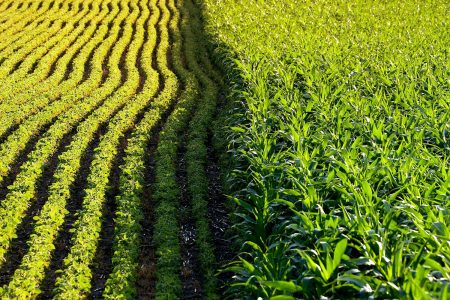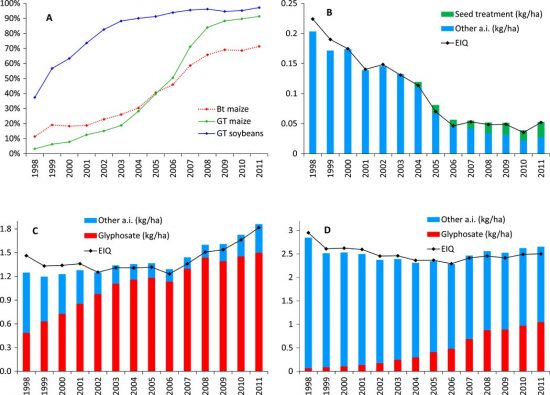October 10, 2016 – Research at University of Virginia, Kansas State, Michigan State and Iowa State Universities studying the period from 1998 to 2011, assembled directly-observed farm-level data from 5,029 soybean and 5,424 corn farmers in the United States. The research represents the most significant look at genetically modified seed first introduced in 1996. Any previous studies covered much smaller time periods with none exceeding two years of data collection. All seed used by the farms studied incorporated genetic modifications to deter insects and weeds. The crops being grown contained one or more modified genes to help the plants tolerate herbicides and insecticides. There was specific interest in the use of Roundup (the Monsanto herbicide that contains glyphosate).
Genetically modified seeds were first produced As background the study provides the following statistics.
- genetically modified soybeans accounted for 94% of all plantings in 2015 in the United States.
- genetically modified corn accounted for 93% of all plantings in 2015 in the United States.
- plantings of glyphosate-tolerant (GT) soybeans have exceeded 80% since 2003.
- plantings of GT and insect resistant (IR) genetically modified corn have exceeded 80% since 2008.
The four graphs appearing above appear in the study. The top left graph illustrates adoptions of GT soybeans, corn and a third genetically modified corn containing genes from Bacillus thuringiensis, hence BT. The top right graph shows the amount of insecticide used on corn plantings over the duration of the study. The lower left graph displays herbicide use on soybeans and the lower right herbicide use on corn.
Striking trends noted in the study:
- an increase in the use of glyphosate for both soybean and corn as seen above in the bottom two graphs.
- a decline in the rate of use of insecticides applied to corn (11.2% less than farmers growing unmodified seed).
- BT corn produced significant benefits in fighting corn rootworm and corn borer and produced benefits for non-adopters as well by suppressing these infestations over areas beyond genetically modified plantings.
- a decline of 1.3% in herbicide use per hectare for genetically modified corn plantings versus farmers growing unmodified seed over the period of the study.
- an initial decline in herbicide use per hectare for soybean and corn plantings with an increase in use over the last 5 years of the study pointing to growing weed resistance to glyphosate.
University of Virginia economist, Federico Ciliberto, who led the study states in reference to the last trend described above, “In the beginning, there was a reduction in herbicide use, but over time the use of chemicals increased because farmers were having to add new chemicals as weeds developed a resistance to glyphosate…Evidence suggests that weeds are becoming more resistant and farmers are having to use additional chemicals, and more of them.”
The challenge of humans attempting to fight biological adaptation is well illustrated by Ciliberto’s comment. For every genetic modification made to a crop to improve yields the natural world learns to adapt and eventually evolution yields a resistant solution. The downside to all of this is the escalating war has unintended consequences such as negative impacts on useful insects and biota that help farmers as well as increased air and water pollution from application of herbicides and insecticides.
Can agricultural science find a better way to ensure increasing crop yields and stave off the impacts of climate change both present and future while minimizing unintended consequences? The chemical companies like Bayer (Monsanto’s purchaser), Dupont, BASF and others may be reaching their technological limits in helping plants adapt to what nature can throw at them. So what next?



















